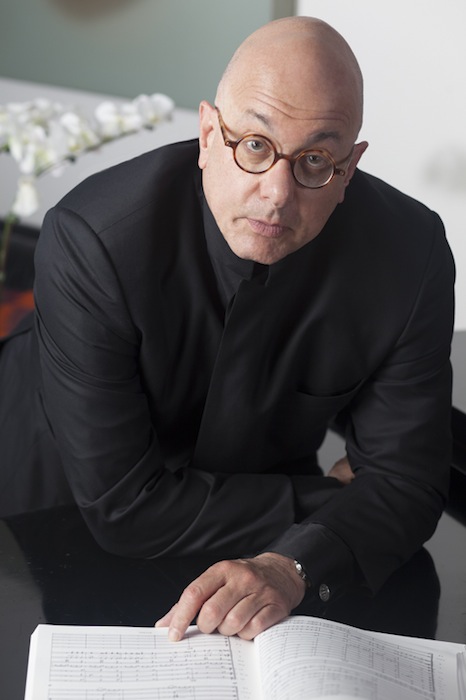Good intentions, uneven performances from Botstein, The Orchestra Now

Leon Botstein conducted the debut concert of The Orchestra Now Sunday at Lincoln Center. Photo: Ric Kallaher
Leon Botstein, Bard College president and music director of the American Symphony Orchestra, has a new initiative. The Orchestra Now, or TŌN is a training orchestra for masters level musicians, located at Bard, and now at the start of its second season.
TŌN bears the mark of its leader, familiar from the American Symphony Orchestra; imaginative programming, outreach to audiences and the community, and playing that spanned the gamut from fine to poor.
The program for Sunday afternoon’s concert at the Rose Theater at Lincoln Center was one that many concertgoers desperately wish they might hear from the New York Philharmonic, or orchestras visiting at Carnegie Hall; music by Marc Blitzstein, Leonard Bernstein, and Aaron Copland. There was a substantial crowd on hand, some of whom had purchased tickets through a Groupon buy, and all pushed their way through the residual scrum from the New York City Marathon. The orchestra’s musicians wrote the program notes and also provided spoken introductions to each work. And the overall response was A for effort, but frustration with the results.
The program’s merits somewhat mitigated the feelings of disappointment in the results. All the music was from the mid-1930s to 1940s, when America was passing through one of its most dire periods and composers were creating the great sound of American art music. Blitzstein, Bernstein, and Copland made pieces that were full of strength and confidence in the future, that were sophisticated in values and expression while eschewing the false sophistication of systems and technical ideologies.
Blitzstein is remembered for his great musical The Cradle Will Rock, his opera Regina, and–less so now–his translation of The Threepenny Opera. A terrific composer with few current performances, his concert music is essentially unknown. So there was excitement at the opportunity to hear his Orchestra Variations, from 1934 (the Kurt Weill Foundation helped fund the performance).
The neo-classical piece is indebted to Copland’s own Piano Variations, which premiered in 1931 and had a galvanizing effect on Blitzstein, Bernstein, and other contemporaries. Like Copland, Blitzstein starts with a stern, obdurate fanfare, which TŌN played with a sense of great mass. From there, the variations are almost obsessively curt as in Copland’s aesthetic, each focusing on one discrete aspect of the opening material. Stravinsky comes through in specific rhythms and that particular astringent, lonely sound of woodwinds in close harmony.
On first hearing, the performance did not do the music proper justice. The sense of mass held throughout, even when it was musically inappropriate, and the overall playing was too heavy and unvaried, sluggish in mood and tempo. Botstein kept the line moving, but never gave the piece any shape—composers dig deep into themselves in variation form, and the path through one to the next is a journey of discovery, but one would never know it from Botstein’s monotonous interpretation.
That sense of weight—the conductor’s trademark—was more appropriate in Bernstein’s angsty, impassioned Symphony No. 1 “Jeremiah”. It is no criticism of the music to point out that it has the sound of a young man, still lacking experience, with the grandiosity to wrestle with “the struggle that is born of the crisis … of faith,” in the composer’s own words.
That youthful hubris, so important to young artists, brought out the best in TŌN, which played with fervor. Though they could not make the rhythms of the second movement leap, they produced a magnificent sound in the great climaxes, like at the end of the opening “Prophecy” movement. Mezzo-soprano Jill Grove sang the vocal part in the final movement, and was excellent. Her resplendent tone cut through even the thickest orchestral texture, and her expression was fiery and proud.
The second half was all Copland; Statements for Orchestra, from the same period and style as the Piano Variations, and Appalachian Spring. Early Copland and later Copland, the sound of American myths and ideals, are not far apart. The lean, chiseled angularity and rhythmic suppleness spanned the two periods, but Copland traded a young man’s puritanical severity for a communal warmth. His craft also developed exponentially, and the complexities of his music, which at the beginning were on the surface, grew more subtle.
Each piece was something of a challenge for the musicians. Intonation in the second violins was sometimes wobbly, and the violas did not project. In the “Cryptic” segment of the episodic Statements, a hand off from the horns to the trumpets was flubbed, and balances were a problem both between and within sections.
The “Jingo” movement was delightful, though. The music was a loving parody of both patriotic marches in general and Ives’ own parodies of marching bands. TŌN played it with the right balance of mirth and glee, and got the section’s concluding punchline just right.
In Appalachian Spring (the suite for full orchestra), Copland frequently plays with opposing rhythms and pulses, and these tended to diverge during the performance, especially in the “Subito Allegro” section. The playing was also too eager at the start, where the music demands a simple expression, and then too polite later, when there’s plenty of opportunities for the strings to slash and the drums to pound. Despite the weighty sound, there was no real Copland-esque bite,
Yet at the coda, the return of the opening music was perfect, achingly spare and simple. And across both pieces there was the strong feeling that the musicians loved the music and loved playing it, something too rarely evident from big-name professional orchestras.
The Orchestra Now plays Shostakovich, Prokofiev, and Myakovsky 7:30 p.m. December 9 at Carnegie Hall, . theorchestranow.org